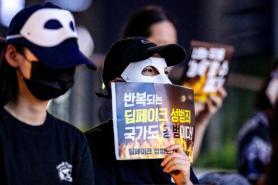
SEOUL -- South Korea will deploy specialized software designed to detect whether video clips or image files have been manipulated using Deepfake techniques in crime investigations. This announcement comes about a month before South Korea's general election scheduled for April 10.
Deepfake technology, driven by artificial intelligence, enables the alteration of videos or images by replacing the face of a person in the original content with that of another individual. This face-swapping technology is frequently exploited to create explicit content featuring prominent figures or to propagate misinformation using the likenesses of influential personalities. In some cases, Deepfake techniques are utilized for digital phishing schemes aimed at deceiving victims into transferring money to criminals.
According to data released by the National Police Agency in August 2023, a total of 160 cases involving Deepfake crimes were investigated in 2022, with an apprehension rate of approximately 50 percent. Individuals can access Deepfake-based video creation services to produce illicit clips for as little as 30,000 won ($22.4).
The National Office of Investigation (NOI), a bureau under the National Police Agency, has developed Deepfake detection software capable of analyzing and verifying whether a video clip has been manipulated using face-swapping techniques in less than 10 minutes. Additionally, the software can generate an analytical report to aid in investigations.
While foreign-made detection software exists, the facial data used in its development primarily pertains to individuals of Caucasian descent, posing challenges in detecting and analyzing the faces of Asians. Investigators report that the homemade Deepfake detection software boasts an accuracy rate of approximately 80 percent, and they intend to use the analytics results as supplementary information to assist in solving criminal cases rather than as direct evidence.
In February 2023, police authorities petitioned the Korea Communications Commission (KCC), South Korea's regulatory body for internet and mobile communications, as well as content broadcasting, to block access to an online video featuring President Yoon Suk-yeol. The brief video clip uploaded to YouTube depicted the president purportedly confessing, "I, Yoon Suk-yeol, have harassed citizens." The KCC promptly removed all instances of the video from the internet and implemented measures to prevent its re-upload.
Copyright ⓒ Aju Press All rights reserved.




